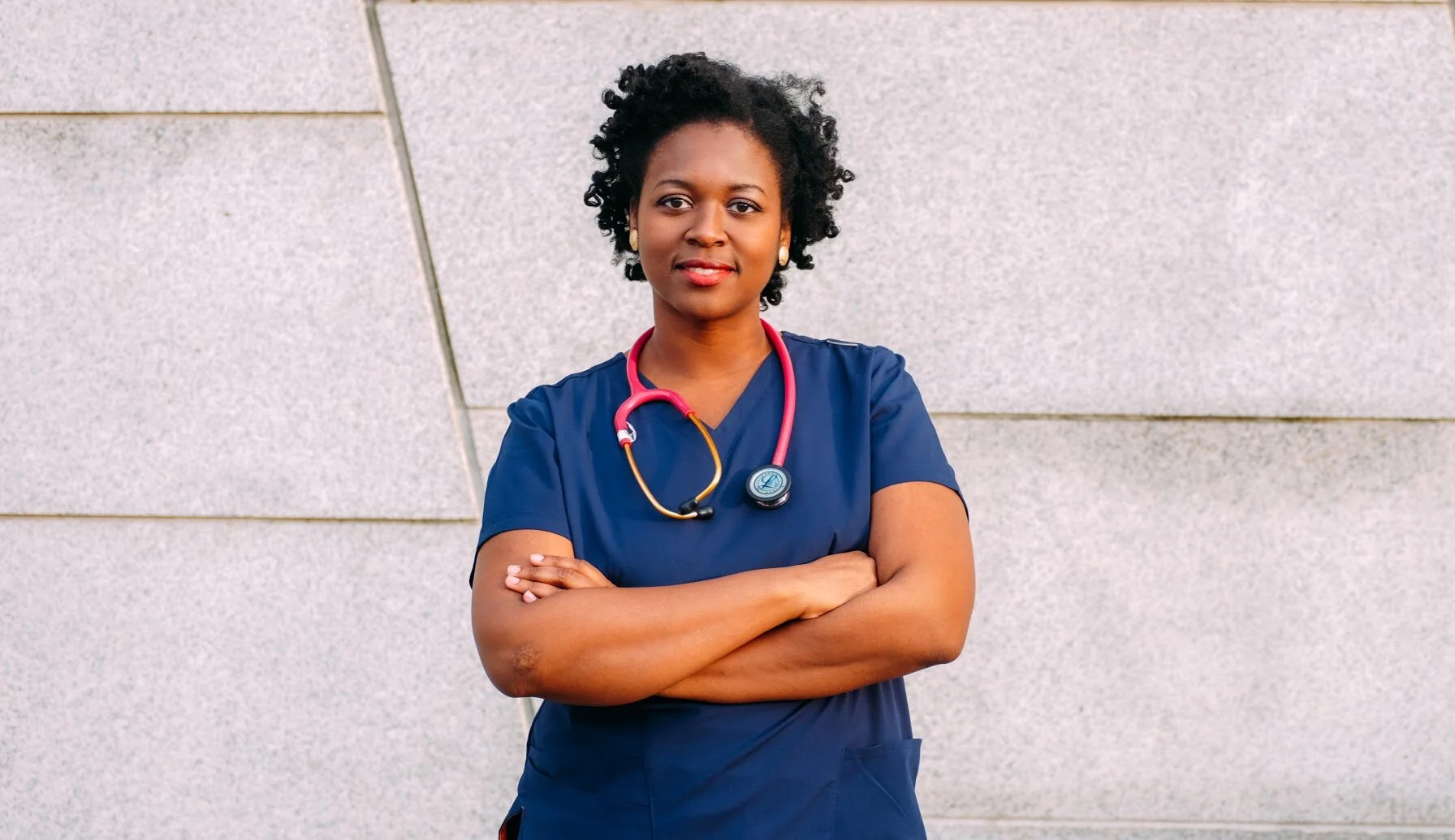This NYC Nurse Is Running For The Assembly In The Middle of COVID-19
A Q&A with Phara Souffrant Forrest
Written By: Jordan White
Phara Souffrant Forrest has dedicated her life to advocating for working-class residents in her Brooklyn neighborhood. Now, the 31-year-old nurse is running for New York State Assembly to continue the fight for just housing, healthcare and labor conditions for all.
Jordan: You grew up in Crown Heights. How did your upbringing inform your political views?
Phara: I was born and raised in Crown Heights and I still live in that same apartment. The neighborhood has seen a lot of change. Longstanding business closed, buildings were “cleaned up” and tenants were forced out. That changed the character of the neighborhood and made it very clear in my mind today that people matter, not profits. That’s why I don’t take any real estate money or money from corporations. Taking money from a donor is like an endorsement, and then those developers have your ear. I want to stay true to the will of the people in my community.
JW: You have obviously observed the drastic changes that the neighborhood has undergone over time. How many community issues remain the same as when you were a child? What new issues have arisen?
PSF: My community is tight-knit because there is a struggle that unites us. In the past few years, we’ve seen new investment and amenities, but only because developers have pushed gentrification. People in my community have always struggled with rent and housing, but we’ve seen more harassment and displacement in recent years because there are profits to be made.
But as our problems change, there are also new ideas about how to make a better world. I’m excited that we’re talking about a Green New Deal for New York. Climate change means we have to change how our society functions. With big change comes an opportunity for massive investment in Black and Brown communities like mine. We just need to make sure we the vulnerable and underinvested communities are prioritized.
JW: What are some issues that COVID-19 has brought to the forefront?
PSF: Who is most likely to get sick from COVID-19? People of color, who are more likely to have bad health outcomes due to comorbidities caused by environmental racism, lack of healthy food, or dangerous work, such as asthma, lung disease and diabetes.
But it’s not just a health crisis. A lot of people don’t know that 40% of my district is rent burdened — paying well over ⅓ of their salary towards rent. People don’t have savings. There’s very little wiggle room when rent is due. People are having to make choices about whether to pay for food, rent or healthcare if they do get sick. This has to change.
JW: Your story is indicative of this truism present throughout Black history: if we want change for ourselves, we have to do it ourselves. Ain’t nobody gonna do it for us. What was the moment for you when you decided to run for office?
PSF: I went up to Albany last June to peacefully protest for historic rent laws in New York and was arrested with my fellow renters. We had planned for a peaceful protest and arrest, but we were met with force by security guards at the capitol. When I was being taken away, I looked out to the crowd and only saw a single elected official (Assemblymember Diana Richardson) standing with the tenants of this state.
I was so proud of what our coalition had accomplished, but when I reflected on the violence that we had faced to guarantee our neighbors a home, I was brought to tears. I knew the working people of this state needed an ally who knows the struggle — who comes from their struggle. The people of my district needed a representative who would actually stand up with them. I decided then that if our Assemblymember wouldn't be that ally, then I would stand up and become the ally the working people in my district need.
JW: How do you organize a grassroots campaign from home? How have you been compensating for the lack of physical gathering? How do you stay energized?
PSF: A lot of time on the phone and the computer! We connect with volunteers, voters and community leaders by phone or video chat. I also really enjoy larger video events and town halls — it’s not the same speaking to a large crowd, but it does make you feel more connected to a bigger political community.
At the end of the day we’re letting people know that we have a candidate fighting to prioritize tenants, workers and our black and brown communities that have seen disinvestment and now gentrification. When I remind myself of this message, it keeps me motivated.
JW: How do you get your friends, family and loved ones involved in the cause? Do you have any advice for people trying to gain momentum or spread the word?
PSF: A huge part of it is the message. Everyone has an issue they care about, whether it’s climate change or healthcare. I don’t tell people to volunteer because it’s all about me. Instead, it’s about building a movement to fight for universal rent control, for free healthcare and stop environmental racism. Focusing on the issues brings people in.
Especially if you have extra free time right now, volunteering to call voters and get the word out is so important. Join the campaign! This is your movement too.
JW: How do you plan to support the young people of your district? What would you say to people who are too young to vote, but want to see changes in their communities and daily lives?
PSF: We need to make sure we have proper programming for youth. When I worked as a youth educator, I realized we needed so much, like mental health services and college and career training. We need to build more community centers and YMCAs instead of luxury developments. Providing our kids with educational programming and training builds transformative leadership. When they’re engaged, they feel empowered to do something better for themselves, their families and their communities. They just need the opportunity to grow.
You don’t need to be 18 to change your community for the better. I started doing tenant organizing when I was 16! You can volunteer with a community group, a mutual aid group or a campaign you believe in.
JW: Does your heritage and history inform the work you do? If so, how?
PSF: I am a proud working class Black woman. Both my parents were proud union members — we spend a lot of time talking politics as a family.
My parents are also Haitian immigrants and even when I was ten, my dad was talking to me about the occupation of Haiti and telling me not to trust “the system.” We would listen to radical radio shows and go to protests against police brutality at City Hall. Seeing my dad in this fight with his political community made me think, “this is what I want to do.”
Read more like this in The Money & Power Issue of Our Journal
The Money & Power Issue tells the real story of Black wealth (or lack thereof) and reimagines a Black existence in America that imbues us with agency and perspective.
JW: You’re a union nurse. Knowing what you know about the city’s healthcare system, what, in your opinion, needs to be prioritized in order to adequately address this crisis?
PSF: Being responsible for the health and wellbeing of another human being is not something I take lightly. As a nurse, I took an oath to advocate for my patients. And if I don’t live up to this oath, I know my fellow nurses will call me out.
We would benefit from having more legislators trained in this kind of advocacy. We need an advocate who will make sure nobody pays a cent for coronavirus treatment. We need an advocate who will make sure that all our hospitals — especially in communities of color — are adequately funded. Our governor and legislature just cut $400 million from the budget for our most under resourced hospitals. I know from experience that our safety-net hospitals need more funding, not less.
As a nurse, you understand that our working conditions matter for patients. I see my coworkers overworked and undersupplied. This is unsafe for patients and workers. Healthcare workers must get what they need to safely do our jobs, especially personal protection such as gloves, masks and gowns.
JW: What does an average day look like for you?
PSF: I start off with a staff meeting to talk about our strategy of connecting to voters, fundraising and communications, like which interviews I have lined up and what I’m doing on Twitter.
We also talk overall strategy: Which groups in the district are we reaching out to? How can we build our coalition? How are we still connecting to the broader movement: by supporting mutual aid networks or going to a rally? I recently went to a speak out with my fellow nurses to protest the bailout that Wall Street is getting while our healthcare system is underfunded and nurses still aren’t getting protective equipment. We all wear masks and stand six feet apart, but we’re still rallying.
Then I’ll meet with a housing leader, like the coordinator of the Housing Justice for All Coalition, and have some lunch because I need to eat. Calling donors to fundraise is a necessary part of what I do because we need money to run our campaign. Then I’ll also check in with voters and our volunteers. I’ll usually join some kind of town hall event in the evening, do a last minute workout, then go to bed.
JW: You got involved in tenants rights activism at 16, and have continued that fight to this day. I think something that’s very beautiful about your character — and, something that captured Sanders supporters throughout his campaign — is that you’ve remained consistent and passionate about the things you believe in. Many people who find themselves fighting for certain issues at a young age experience an extreme level of burnout over time. How have you remained so focused throughout the years? What advice would you give to young activists who are starting to lose energy and hope?
PSF: I get exactly what you’re saying. I think the key to keeping from getting burned out is doing what you can while understanding where you are at right now. If you care about climate change, honey, do that. If you want to get involved with women’s rights, do that. All of these issues connect. Right now I care a lot about Black mothers and maternal health but I know that it’s part of the fight for housing justice, economic justice and climate justice. All these issues are connected — you don’t have to do everything.
Also, I think whatever you do has to be personal. I remember lobbying for the DREAM act back in high school because my best friend was undocumented. In college, I stayed involved fighting for immigration justice. I didn’t have to be the president of a group or club — I stayed involved because it was a personal issue for me.
JW: What is your favorite thing about New York?
PSF: Oh my god, the food. There’s Moroccan food, bibimbap, ramen, roti, the Jamaican guy who makes the best pizza on Utica Ave... Where else can you get jerk chicken and pizza at the same time? We have anything you’d want to sample from across the world.
Read more about Phara and her platform on her website.






